Incidentally, as soon as I made this list, I thought about other books that have fair claim to being on this list. I guess I'll have to do another one at some point.
1. Isaac Asimov's 'The Caves of Steel'
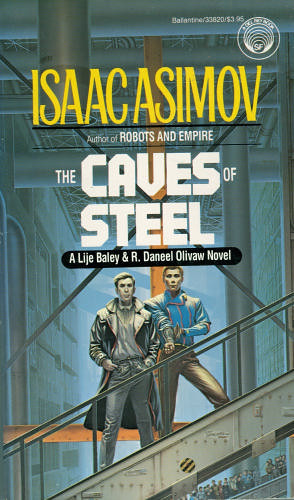
For those of you who have no idea who Asimov is, shame on you. He is easily one of the greatest SF and general science writers of all time. If it weren't for him, I would probably have ended up as a history major instead of a physicist. He's also the only stranger whose death I can honestly say I was affected by. The recent 'I Robot' movie was an entertaining perversion of his most enduring creation, the three laws of robotics. One of these days, you guys will get a post solely dedicated to him, but for now, I'll stick to the script.
When people talk about his works, They usually consider the 'Foundation' books or his Robot stories to be his best work. Me, I've always been partial to the Elijah Bailey and Daneel Olivaw books, perhaps because they combine good detective stories with very effective commentary on race. This is the first in the series.
In Asimov's fictional future, humanity is split up into 'Earthers', human beings bound to the planet earth, and 'Spacers', a spacefaring group who have longer lives and access to better technology, like robots. Urbanization plus population growth means that most earthers live in ultra large cities from which the book derives its name.
One of the main characters, Elijah Bailey, is an earther police officer who hates spacers and robots equally. When a high ranking spacer is murdered, he gets assigned to the case. Because of the sensitivity if this case, however, the spacers insist he take along a robot partner, Daneel Olivaw, a robot made in the image of the dead man. The rest of the book is part detective story, as they track down the murderer, and partly about the nature of prejudice, as Elijah is forced to confront his feelings, and those of general Earther society, about both Spacers and robots. To a certain degree, the two of them even bond and form a sort of friendship.
2. Ursula K. LeGuin's 'A Wizard of Earthsea'
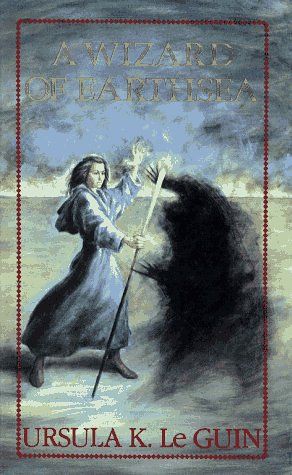
Ursula Leguin's most beloved series. I still remember the first time I read this book. Actually, it was just the first chapter. It was part of an anthology of SF short stories that a girl I liked 'liberated' from her parents bookshelf for me (sidenote, I wonder what happened to her?). I remember reading it over and over, instantly drawn in by the images her words created.
Oh, for the record, I will not be discussing the Scifi channel's whitewashed and destroyed show that was supposedly based on this book. Ursula said it better than I ever could and I really don't need to get agitated today.
The basic story has to do with the growth of the main character, Sparrowhawk. Through him, we learn valuable life lessons. Among them, that power is only to be used in moderation, unless the situation demands it and that in all people there exists both the good and the bad, and they are both necessary to balance each other out. The other great thing about this book, which was apparently missed by a lot of people, was the fact that Sparrowhawk and his people weren't white. As a woman in the genre, Ursula became sensitive to the fact that a lot of science fiction was little more than a space for the heroic white male power fantasy. In response, she made her protagonist Native American as her way of challenging that perception (BTW, the entire idea of white male power fantasies in SF and comic books is one I shall revisit sometime soon).
3. Arthur C. Clarke's 'Rendezvous with Rama'
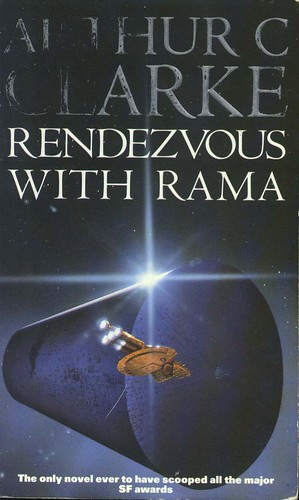
Arthur C. Clarke, allegedly the R-Kelly/Michael Jackson of SF writers (along with Piers Anthony, if the rumors are true). This is the man who invented the concept of the geosynchronous satellite. One of the things that always interested me about him was the fact that he was actually a practicing physicist for a large part of his life and it tended to show in the small scientific details in his books.
Now, I know what some of you are thinking, why not '2001'? Why 'Rama', which isn't anywhrer near as well known? Simple. This is my list and as a kid I enjoyed reading Rendevous with Rama far more than I enjoyed 2001 which, in my opinion, has a tendency to be overrated because of the brilliant Kubrick movie. Maybe, if Morgan Freeman gets his way and the Rama movie gets made it'll finally get the respect it deserves.
The story behind it is fairly simple. In the near future a cylindrical object enters our solar system. After it becomes obvious that there is nothing natural about it, a team if investigators are sent into space to explore it and figure out what its doing here. Once they get there, they find that its hollow and contains a small city. The rest of the book is mainly about their attempts to figure out the purpose of Rama, as they decide to call it.
What made this book great for me was the fact that it seamlessly merged 'hard' science with good storytelling without compromising either. It was also one of the first books I read to step away from the paradigm of the humanoid alien and seriously allow for the possibility that life could exist in forms that we can't possibly imagine. While this also holds true for his 2001 books, I always preferred the execution in these better.
4. Frank Herbert's ''
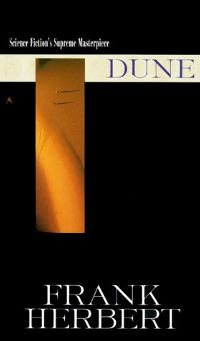
Frank Herbert was a genius. There is little more to it than that. In the 'Dune' books, he created a huge, painskaingly detained world and then used it to tell great stories while meditating on a wide range of issues including religion, politics and ecology. I could probably ramble on about his work for hours if given a chance. The books were incredibly dense in terms of themes explored and yet they were entertaining enough to spawn movies, spinoff books and video games. Honestly, I still don't remember if I saw the movie first or read the book. It really doesn't matter either way. Both hold a very special place in my childhood.
5. Douglas Adams' 'The Hitchhiker's Guide to the Galaxy'
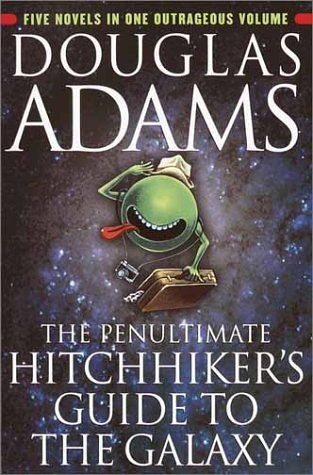
What can I possibly say about these books that will do them justice. Douglas Adams still remains, in my mind, one of the funniest human beings to ever pick up a pen. Actually, I blame my sometimes quirky sense of humor squarely on him. Since the movie just came out, you probably don't really need me to explain the basic premise behind the story to you. I'll just say that this book was responsible for many hours of enjoyment for me as a kid. I always related to Arthur Dent, the person who never quite fit in anywhere. Watching him grow and learn was a great thing for me.
Incidentally, it holds a very special place for me because of a link to the very first girl to break my heart. Long story but basically we took turns checking it out of the school library and spent long hours talking about it (I wasn't lying when I said I like geeks. Always have)
Anyway, thus concludes my list. Considering what else could have been on this list, I'll probably have to make another one soon.

2 comments:
I was into science fiction but not that heavily, so I was mildly surprised that I've read all five of these and thought they were great.
Great choice...but why did you leave out TOLKIEN??? Heresy!!!
Post a Comment